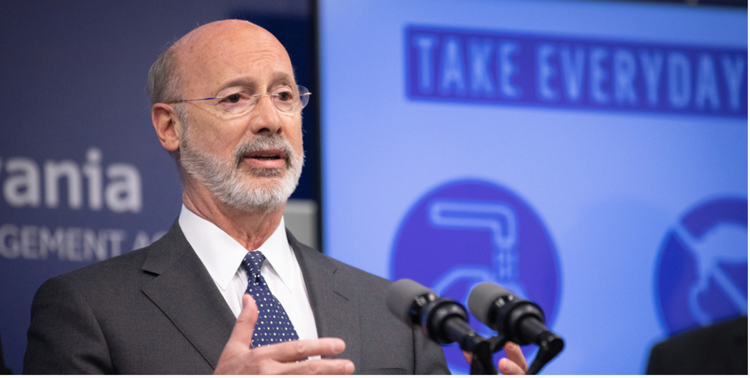Constitutional amendments would limit Pennsylvania governor’s authority during emergency declarations

Pennsylvania Gov. Tom Wolf addresses the news media on June 10, 2020.
(The Center Square) – The Pennsylvania House approved three constitutional amendments Tuesday that would limit a governor’s powers during emergency declarations – a direct rebuke to Gov. Tom Wolf’s handling of the COVID-19 pandemic over the last four months.
“Amending our state Constitution is not something we should take lightly; however, we believe doing so is necessary,” said House Majority Leader Kerry Benninghoff, R-Centre. “Our communities should decide for themselves how they wish to be governed.”
Senate Bill 1166 returns to the upper chamber for a concurrence vote after the House approved the measure 115-86. The proposal requires the governor seek legislative approval for any extension of a disaster declaration beyond 21 days. It also specifies that a concurrent resolution passed in the General Assembly need not be presented to the governor in order to become effective – this after a state Supreme Court ruling issued July 1 determined current law requires otherwise.
The bill must pass both chambers in two consecutive sessions before appearing on the ballot. It’s the latest twist in a monthslong war between the Legislature’s conservative majority and the Democratic Wolf administration over how far statewide restrictions on the economy should go during the pandemic.
Wolf has maintained the emergency powers afforded to him during a disaster declaration – enshrined in state law dating back four decades – give him the authority to enact strict mitigation efforts, like shutting down restaurants or bars, while also leveraging financial aid and state resources to coordinate the best response.
But Republicans say his efforts have gone too far and lack consistency, crushing small businesses, spiking unemployment and descending the state into an economic crisis far worse than necessary. SB 1166 would unravel the governor’s standing and give the Legislature more control over how long disaster declarations can last.
Crucially, a governor cannot veto constitutional amendments – making SB 1166 a last-ditch effort to defeat Wolf’s pandemic policies, albeit a symbolic win only.
“We believe the power of our Commonwealth truly rests with the people. Pennsylvania is not a dictatorship, and the voters should ultimately decide,” Speaker of the House Bryan Cutler, R-Lancaster, said. “We are a coequal branch of government and have tried at every turn to work with the administration, including asking to join a multi-branch, bipartisan task force to manage this crisis. The governor turned us down, deciding instead to go it alone for months on end.”
Although a handful of Democrats broke ranks to the support the bill, most of the party’s members criticized the move as misguided and dangerous, with several crediting the administration’s decisive actions for slowing the spread of the virus and preventing thousands of deaths.
“In the absence of real national leadership, Pennsylvania has stepped up to flatten the curve of this deadly pandemic,” said Rep. Matt Bradford, D-Montgomery. “The tough choices Gov. Tom Wolf has made so far have worked – let’s not go backwards.”
Senate Minority Leader Frank Dermody, D-Allegheny, noted that 21 days into the pandemic, “we knew very little” about the virus or how to mitigate it. Without the administration’s sweeping economic and travel restrictions, Pennsylvania would look more like Florida, Arizona or Texas, he said.
“There is chaos in Washington happening with this virus, and that’s something we don’t want trickling down to Pennsylvania,” he said.
The vote comes the same day Wolf vetoed House Resolution 836, the concurrent resolution that would have ended his COVID-19 disaster declaration. Wolf enacted the emergency order on March 6 and extended it an additional 90 days on June 3.

